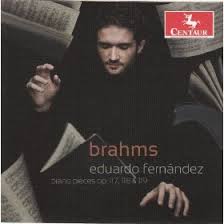Pianist Eduardo Fernández first caught my attention through his superb recording of Albéniz’s Iberia. His second solo release is devoted to late Brahms, and for the most part it proves equally captivating. Fernández begins the E-flat Intermezzo Op 117 No. 1 by slightly hesitating over certain beats and phrasing inner voices so that they move over the barlines. No. 2 is similarly free and ruminative, the register leaps in No. 3’s central major section intensified with sharp accents.
You might argue for a steadier basic tempo in Op. 118 No. 1, yet Fernández’s rhythmic freedom generates convincing harmonic tension in the accompanying arpeggios. He plays Op. 118 No. 2 in a similarly halting and emotionally compelling manner to his Op. 117 No. 1 interpretation. By contrast, the G minor Ballade is straightforward and even a bit brusque, while the F minor Intermezzo abounds with rhythmic leeway and unorthodox balances between the hands.
Both Op. 118 No. 6 and Op. 119 No. 1 achieve heightened expression through Fernández’s poetic, flexible phrasing and lingering tenutos. Such outlining, however, yields overly fussy and fragmented results in the little C major Intermezzo Op. 119 No. 3 that Myra Hess made famous (she played it more simply and gracefully). Although his slight broadening of phrase endings grows increasingly predictable in the Rhapsody Op. 119 No. 4, Fernández’s brisk and jaunty tempo refreshingly contrasts to the slower, heavier, more pompous norm typical of today’s younger pianists. You may not agree with each and every interpretation, yet there’s no doubting Fernández’s genuine affinity for this repertoire and his seriousness of purpose. Well worth hearing.
































